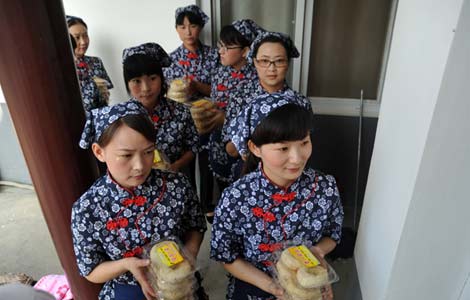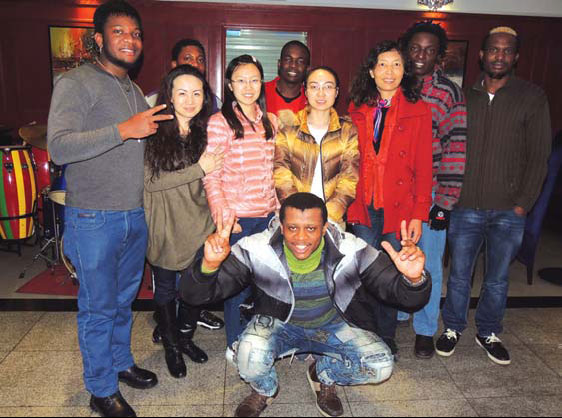Sounding out of Africa
Updated: 2013-07-04 07:52
By Mu Qian (China Daily)
|
||||||||
|
Nigerian singer Lo-d performs in a Guangzhou club. Photos provided to China Daily |
The number of African musicians in China, especially in Guangzhou, is growing, creating new types of harmony between the two lands. Mu Qian reports.
Nigerian Lo-d rates his singing by the dancing of the crowds for whom he croons.
The vocalists' shows in Gaungdong's provincial capital are typically a writhing mix of Chinese, compatriots and other foreigners dancing to his highlife, hip-hop and R&B songs.
"If they don't dance, that means I'm not doing well," he says.
Lo-d - his stage name is short for "Lord's Own Design" - takes the stage of such Guangzhou venues as Kama Club, Town Bar, Duo Club and Banker Club.
He sings in English and his native Igbo.
"My Chinese is not very good, but I hope to sing in Chinese soon," he says.
"I also want to collaborate with Chinese artists."
Lo-d lives a double life typical of Guangzhou's African musicians, who do business by day and take the stage by night. The city ranks among the country's top commodities-trading bases, which has caused its African population to swell since the 1990s.
University of Hong Kong African studies program director and author of the 2012 book Africans in China Adams Bodomo says there are about 500,000 Africans in China, and Guangzhou hosts the largest population.
Africans in China include at least 300,000 traders, 30,000 students, 4,000 professionals, 10,000 tourists and 10,000 business travelers, Bodomo says.
"Wherever there are Africans, there is good music - just like wherever there are Chinese, there is good food," Wesleyan University associate professor of music and East Asian studies Su Zheng says.
"When I read reports about Africans in China, I became very interested in the music of the African diaspora."
When Zheng found no reports about the music of Africans in China, she decided to research it.
Since last year, Zheng and three graduate students from the Shanghai Conservatory of Music conducted fieldwork several times in Guangzhou. They interviewed 51 Africans, including 14 musicians.
It's difficult to estimate the number of African musicians in Guangzhou, since most don't work full time as musicians but do business, too.
"Unlike most Chinese, Africans typically don't distinguish between professional and amateur musicians," Zheng says.
Lo-d has been playing music for eight years. He owns a studio in Nigeria, where he released his first album a few years ago. He recorded his second CD in Guangzhou.
Another Nigerian singer who goes by the stage name Stainless also recorded in Guangzhou. He also made a music video in Guangzhou of his song Stainless Love, which can be viewed on the Chinese video-sharing website Youku.
The city is gaining favor among China's African musicians.
"Guangzhou is a nice city. I have many Chinese friends here," says Paulinus Aniekwu, who has lived in China for five years and acts as a community leader of people from Nigeria's Enugu state in Guangzhou.
Aniekwu is also conductor of the choir at Guangzhou's Sacred Heart Cathedral, which includes people from many countries.
However, most Chinese still know little about Guangzhou's African community.
Shanghai Conservatory of Music graduate student Ma Chengcheng, who joined Zheng's research team, says she came to better understand this during her fieldwork.
"When I told an African we met in Guangzhou that I like African music, he responded: 'Really? Are you sure you like African music - not African-American music?'" Ma says.
"I felt embarrassed. In fact, we don't really know African music."
Aniekwu says Guangzhou's Nigerian community will stage events this year to showcase African culture.
"We will hold a festival in Guangzhou to present African music and dance, and I hope Chinese people will enjoy it," he says.
Zheng and her team are working on a series of articles about African music in Guangzhou for the Chinese magazine Musical Art.
Her team will present at the 56th Annual Meeting of the African Studies Association: Mobility, Migration and Flows, held from Nov 21 to 24 in the US city of Baltimore.
The Xinghai Conservatory of Music's Lingnan Music Culture Research Center in Guangzhou is constructing a Web page to introduce the city's African music.
"Will African music become a part of Chinese music?" Zheng asks when she presents at Chinese conservatories.
While it seems improbable, Zheng says her findings show it's plausible.
She makes comparisons to her book Claiming Diaspora: Music, Transnationalism and Cultural Politics in Asian/Chinese America.
"Chinese music in the US has a history of 160 years," she says.
"Under the 19th-century Chinese Exclusion Act, Americans never imagined Chinese music would influence their homeland. But any book on the subject today shows it did.
"So maybe we should think about the question of African music in China now and look at it again 100 years later."
Contact the writer at muqian@chinadaily.com.cn.
|
Su Zheng (third from right) and three graduate students from the Shanghai Conservatory of Music with African musicians, including Otigba (center) and Lo-d (left) in Guangzhou. |
(China Daily USA 07/04/2013 page8)

 Ecuador finds spy mic for Assange meeting
Ecuador finds spy mic for Assange meeting
 US martial artists arrive at Shaolin Temple
US martial artists arrive at Shaolin Temple
 July 4 in Prescott: Balance of grief, patriotism
July 4 in Prescott: Balance of grief, patriotism
 Jubilant crowds celebrate after Mursi overthrown
Jubilant crowds celebrate after Mursi overthrown
 Growth slowing for services
Growth slowing for services
 Venezuela eyed as Snowden seeks asylum
Venezuela eyed as Snowden seeks asylum
 Anti-terror drill staged in Xinjiang
Anti-terror drill staged in Xinjiang
 Memorial service held for 19 Arizona firefighters
Memorial service held for 19 Arizona firefighters
Most Viewed
Editor's Picks

|

|

|

|

|

|
Today's Top News
US welcomes China's engagement in Africa
Data show shifts in US, China economies
Obama, Merkel agree talks on surveillance program
Filipino executed for drug trafficking
Obama orders US to review aid to Egypt
Snowden still in Moscow
China urges more efficient uses of fiscal funds
Egypt army topples president Morsi
US Weekly

|

|








